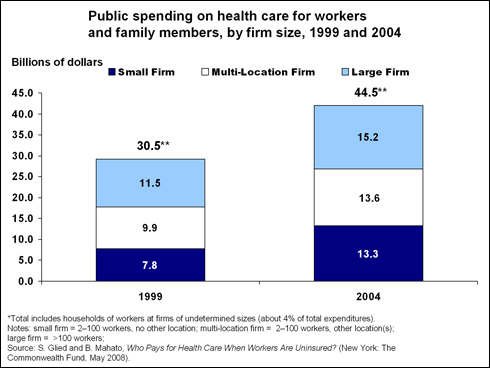A Commonwealth Fund-supported study finds that the public, along with workers, foot the bill when employers fail to provide their full-time workers with health insurance. Eroding employer-sponsored health insurance is costing U.S. taxpayers $45 billion a year, which includes $33 billion to cover public insurance—such as Medicaid or the State Children Health Insurance for Program—for workers and their dependents, and $12 billion for uncompensated health care that would otherwise covered by the workers' private insurance.
According to Who Pays for Health Care When Workers are Uninsured?, by Columbia University's Sherry Glied, Ph.D., and Bisundev Mahato, 19 million full-time workers and their dependents were uninsured in 2004, compared with 16 million in 1999. As a result, public costs associated with uninsured and publicly insured working families were 45 percent greater in 2004 than in 1999 (adjusted for general inflation).

In a companion Fund brief, The Widening Gap Between High- and Low-Wage Workers, Glied and Mahato show that low-wage workers (earning $9.80 per hour or less) are more likely than high-wage workers to be uninsured. Low-wage workers are less likely to go to the doctor when they were sick, to have a usual source of care, or to receive preventive services such as blood-pressure checks. Both studies conclude that falling rates of employer-sponsored coverage are placing an increasing burden on taxpayers, public health insurance programs, and workers themselves—particularly low-wage earners.


